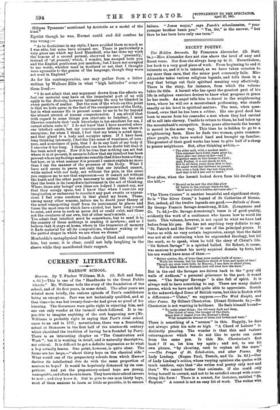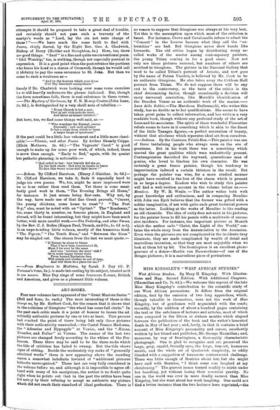RECENT POETRY.
The Hidden Berrants. By Francesca Alexander. (D. Nutt. 6s.)—Miss Alexander does not rise above the level of easy and fluent verse. Nor does she always keep up to it. Nevertheless, her book is a very good piece of work. From beginning to end it interests us, and it is in interest, as we have taken occasion to say more than once, that the minor poet commonly fails. Miss Alexander takes various religious legends, and tells them in a way that brings out their spiritual meaning very effectively. There is the story, for instance, from which the volume takes its title. A hermit who has spent the greatest part of his life in religious exercises desires to know what progress in grace he has made. An angel tells him to travel to the neighbouring town, where he will see a mountebank performing, who stands exactly on his level in spiritual matters. The man, when ques- tioned, owns that he has been a robber. His one good deed has been to rescue from his comrades a tun whom they had carried off to sell into slavery. Unable to return to them, he had taken up the mountebank's occupation. Some years afterwards the hermit is moved in the same way. This time he is bidden to go to a neighbouring farm. Here he finds two women, quite common- place people, who have worked hard and brought up families. The greatest of their good works has been to give half of a sheep to poorer neighbours. But, after thinking awhile,— " The elder said, with a modest smile This summer have forty years gone by, Since she—my sister-in-law—and I Together came in this house to dwell ; And, Father, it is not much to tell, But in all these years from first to last, No angry word has between us passed, Nor even a look that was less than kind. And that is all I can call to mind."
Ever after, when the hermit looked down from his dwelling on the hill,—
" He said as he saw the stardike glow Of lights in the cottage windows far,
'How many God's bidden servants are I'"
"The Three Crosses" is another beautiful and significant story. So is "The Silver Cross," a legend of St. Catherine of Sienna. But, indeed, all the twelve legends are good.—Ballads of Down. By George Francis Savage-Armstrong, D.Lit. (Longmans and Co. 7s. 6d.)—Dr. Savage-Armstrong's verse is of good quality, evidently the work of a craftsman who knows how to wield his tools. This volume, however, is not equal to what we have had before from his pen. He has not anything very definite to say. "St. Patrick and the Druid" is one of the principal pieces. It leaves us with no very certain impression, except that the Saint was not at all convincing a hen he expounded theology, but hit the mark, so to speak, when he told the story of Christ's life. "Sir Robert Savage" is a spirited ballad. Sir Robert, it seems, was anxious to protect his newly acquired domain by forts, but his son would have none of them :— " Better castles, Sir, of bone than your castles built of stone ; Walls for women, but for warriors shield of bone and spear of tree Though my sires were bold, by Heaven, I can dare to stand alone, Nor to Irish kern or Norman lord will ever bow the knee."
But in the end the Savages are driven back to the "grey old walls of Ardkeen," a personal grievance to the poet, it would seem. "The Savages' Revenge" is also full of spirit. It is always well to have something to say. There are many dialect poems, which we have not felt quite able to appreciate. Scotch is the acknowledged Doric of British verse, but this is Scotch with a difference—" Ulster," we suppose.—The Wild Knight, and other Poems. By Gilbert Chesterton. (Grant Richards. 55.)—Mr. Chesterton is not wanting in boldness. He feels himself bound- " To make some thing; the old want dark and deep,
The thirst of men, the hunger of the stars, Since first it tinged even the Eternal's Sleep
With monstrous dreams of trees and towns and wars."
There is something of a "scream" in this. Happily, be does not always pitch his note so high. "A Chord of Labour" is distinctly pleasing. The wonder is that this and various extravagances which we do not like to quote can come from the same pen. Is this Mr. Chesterton's first book ? If so, let him try again ; and not, to use his own phrase, "by shouting, seek to orphan all the stars."
The Prayer of St. Scholl:sit:ea, and other Poems. BY Lady Lindsay. (Kegan Paul, Trench, and Co. 3s. 6d.)—One of Lady Lindsay's critics, whose varying opinions she quotes with much candour, says that "she writes real poetry only now and then." We cannot better that estimate. If she could only bring herself to correct, and not to be satisfied except with some- thing like form! There is a sonnets for instance, entitled "St. ttephen." A sonnet is not an easy bit of work. The writer who attempts it should be prepared to take a great deal of trouble, and certainly should not pass such a travesty, of the martyr's words as "Lord, lay the sin not unto charge of these I "—We have much the same fault to find with Poems, chiefly Sacred, by the Right Rev. Geo. A. Chadwick, Bishop of Derry (Hodder and Stoughton, 58.) Here, too, there are good things. " Saul " is a fine and quite unconventional poem. "Idol Worship," too, is striking, though not especially poetical in expression. It is a good point when the poet rebukes the partisan who bares his head to a statue of Cromwell, though he would call it idolatry to pay the same reverence to St. John. But then we come to such a weakness as— "And by the horrors which grew dens.; O'er Thy disarmed omnipotence."
Surely if Dr. Chadwick were looking over some verse exercises he would heavily underscore the phrase italicised. But, though the form sometimes fails, there is real substance in these verses. —The .lifektery of Godliness, by F. B. Money-Coutts (John Lane, 3s. 6d.), is distinguished by a very shrill note of rebellion :— " Every Church is but a sect,
That in pet idols puts its trust, And hates an honest intellect."
But here, too, we find some things well said, as :—
"Who worships the Eternal, yearns Eternally; and each advance Is but a coign from which to learn .A. larger range of ignorance."
If the poet could be a little less vehement and a little more chari- table !—Titania, and other Poems. By Arthur Sheerly Cripps. (Elkin Mathews. 2s. 6d.) —" The Vagrants' Carol" is good enough to make up for some poor work, of which, indeed, there is more than enough. "Early to Bed," again, with its quaint but pathetic phrasing, is noticeable :— "God called to her: how bravely did she go Up the dark stairs God give us hearts as brave To face this weary noise and light below ! "
—Echoes. By Clifford Harrison. (Henry J. Glaisher. 3s. 6d.)— Mr. Clifford Harrison, we take it, finds it especially hard to judge his own poems. We, too, might be more impressed were we to hear rather than read them. Yet there is some mani- festly good work in them, "The Evening Brings all Home," for instance. It just misses being first-rate. Why not, by the way, have made use of that fine Greek proverb, "Curses, like young chickens, come home to roost " ? "The Post Boy," also, must be noted with an " Optime." The " Rondeanx," too, some thirty in number, on famous places, in England and abroad, will be found interesting, but they might have been much better, with more careful work.—The Underdog, and other Verses, by the Rev. C. J. Boden (Kegan Paul, Trench, and Co., Is. 6d net), is an unpretending little volume, mostly of the humorous kind. "The Pigeon," "The Tenth Muse," and "Between the Sizes" may be singled out. One stanza from the last we must quote :— "If Nature be alone to blame
That I have been constructed ill, Must I for ever be the same
And stay 'between the sizes ' still? Or in some happy future state
Prom human lation free,
Will creeds and clothes be out of date. And will there be a place for me ? "
—From Mayflowers to Mistletoe, by Sarah S. Day (G. P. Putnam's Sons, 5s.). is made interesting by its subject, treated as it is eon amore. Miss Day sings of some fourscore flowers, British and American, and gives us a pleasant little volume.























































 Previous page
Previous page